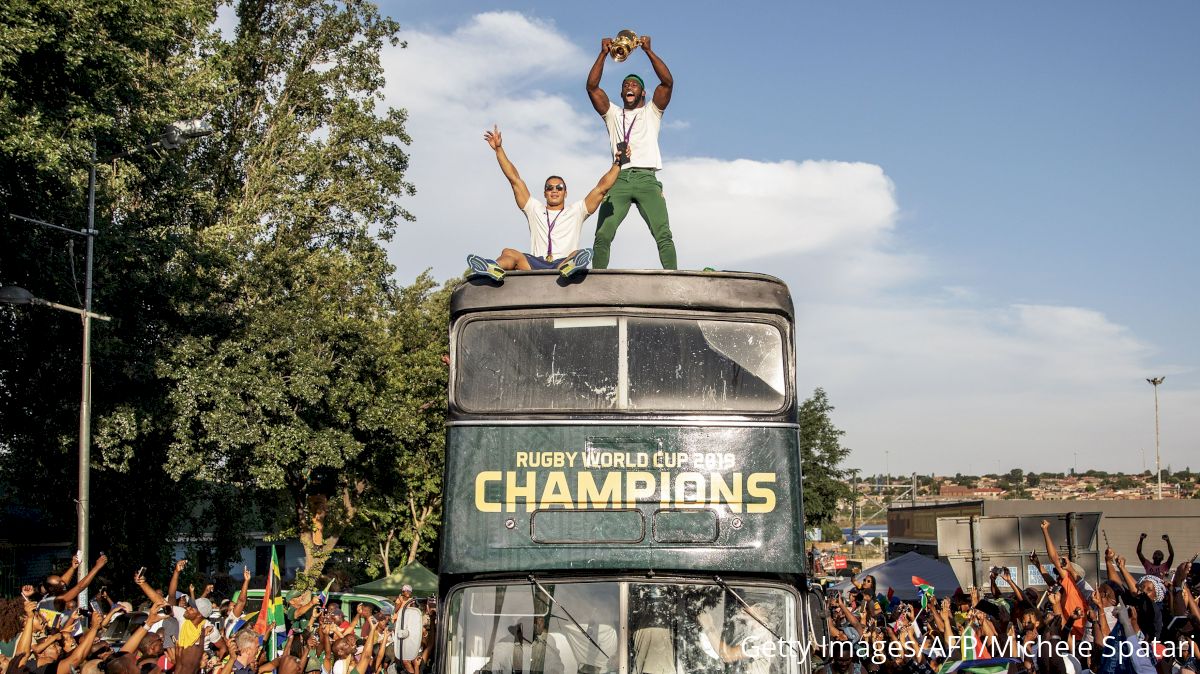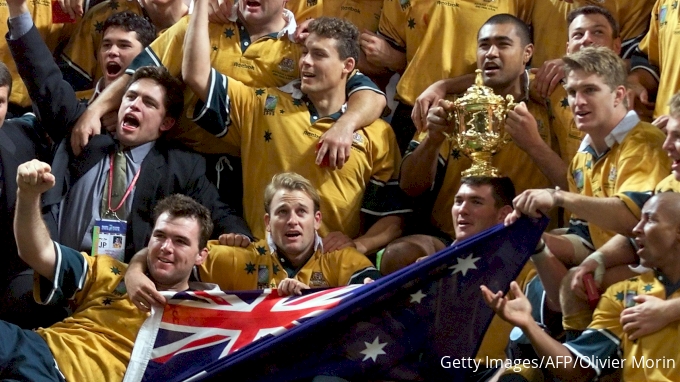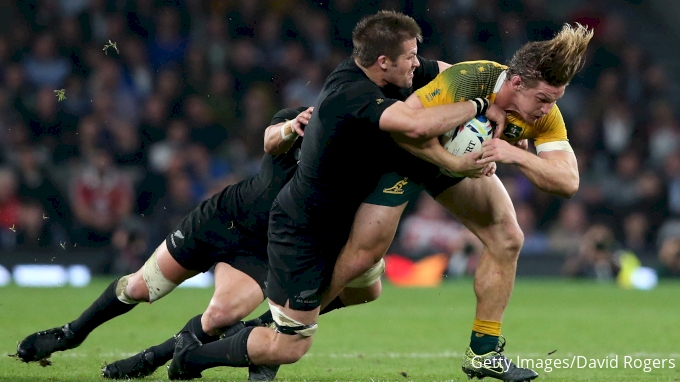Which World Cup Winner Overcame The Toughest Challenge?
Which World Cup Winner Overcame The Toughest Challenge?
These nine squads, captained by eight men, representing four nations, are totems of excellence. They are the grand masters of their sport.

Every World Cup-winning team deserves its place in rugby’s pantheon.
These nine squads, captained by eight men, representing four nations, are totems of excellence. They are the grand masters of their sport. But they are not necessarily equals.
To put it another way, not every title run is the same.
If one of Ireland, France, New Zealand, South Africa or Scotland lift the Webb Ellis Cup in Paris later this year, they’d have accomplished the greatest challenge this game has ever presented. Their side of the draw resembles Mordor, while the other half, one containing England, Wales, Australia, Argentina and Japan, is The Shire, by comparison.
With that in mind, and at the risk of angering fans around the world, I’ve ranked each World Cup winner according to the hardships they faced in the tournament, according to a simple scoring system, awarding one point for each of the following:
- If the World Cup was away from home.
- If the World Cup was outside of region (eg. European team in the Southern Hemisphere)
- If the team beat the previous champions.
- If the team beat best-ranked team (author’s discretion)
- If the team beat the hosts
- If the team beat the reigning Five/Six Nations champions
- If the team beat the Tri Nations/Rugby Championship champions
- If the team emerged from group of death (i.e., three quality teams)
- For any victory over a Tier 1 team (competing in that year’s continental competitions)
New Zealand 1987 – 4*
Admittedly, the very first champions always would lose out on some of the above points on offer, but the All Blacks’ march to victory hardly was Hannibal crossing the Alps.
They whipped Italy, Fiji and Argentina in the group stage, scoring 30 tries along the way, and then made mincemeat of Scotland, Wales and France in the knockout rounds.
David Kirk’s team pick up three points for these wins, another for getting the better of the reigning Five Nations winners in the final, but that showpiece game was the first real test for what clearly was the best side in the competition.
*Admittedly, this tally needs a caveat, given the parameters of the scoring system.
Australia 1991 – 9
The Wallabies under Nick Farr-Jones might not rank alongside future iterations in terms of greatness on the field, but there can be no denying the arduous slog they had to endure to lift Australia’s maiden World Cup.
They beat Wales in the group stage, before edging Ireland by a point in the quarterfinals. Next, they beat the reigning champs and favorite, New Zealand, in the semifinals, and proceeded to get the better of the Five Nations holder, England, in the final.
David Campese finished as the tournament’s top-try scorer and Southern-Hemisphere rugby officially had underlined its status as the game’s epicenter of excellence.
South Africa 1995 – 5
There’s a reason the Springboks’ win a year after the country’s first democratic elections is the only rugby story to get the Hollywood treatment. It defied belief and was a living example of what is possible when a nation’s divided people can come together for a single purpose.
Too bad it doesn’t score highly here.
Francois Pienaar’s men lose out on points, as their tournament was contested on home soil. They also were fortunate in that they played Western Samoa in the quarterfinals, rather than an established Tier 1 nation.
But that was a consequence of beating the reigning champion, Australia, in the opening game in Cape Town.
They pick up another point for edging France in a thriller in Durban, and then the mighty All Blacks, unquestionably the tournament favorites.

Australia 1999 – 9
Another Australian victory across the world earns them four points, and they collect another two for squeezing past the previous winner, South Africa, in the semifinals, thanks in large part to Stephen Larkham’s first career drop goal.
Avoiding pre-tournament favorite New Zealand helped, but this was no simple stroll to the final.
Australia beat three Tier 1 teams along the way, including Ireland in Dublin, Wales in Cardiff and the reigning champion, South Africa, before meeting France at the end of the road.
Once they got there, they took advantage of a knackered French team that had emptied the tank against the All Blacks the week before. Australia scored two tries, and Matt Burke kicked 27 points in a one-sided affair.
England 2003 – 8
Martin Johnson’s side arrived in Australia as the supreme team on the planet, which served them well, but that isn’t helpful here.
They’d already claimed a Six Nations Grand Slam and boasted several players who were the leading figures in their respective positions.
They made light work of South Africa in the group stage and then steamrolled Wales and France in the knockouts. Facing the hosts in the final would prove no easy task, especially as the Wallabies had just vanquished the All Blacks by 12 points in Sydney.
It was a tight affair that was settled by the second-most famous drop goal in rugby history.
Eight points on this chart is a decent haul, but it’s not good enough for a win. No doubt, Jonny Wilkinson is fuming.
South Africa 2007 – 6
Like England in 2003, the Springboks of 2007 had a claim to being the most complete outfit around.
Then, 2009 was the team’s zenith, but an indomitable tight five, a dynamic back row, pace out wide, the world’s best scrum half in Fourie du Preez and Jake White’s simple game plan meant they had the tools to beat anyone on their day.
It’s a shame they weren’t better tested.
Two wins over England – 36-0 win to start and then 15-6 in the final – hands them four points for beating the previous champions, but that’s as challenging as it got for the Boks, who avoided any other Six Nations or Tri-Nations team (Argentina, which was beaten 37-13 in the semifinals, hadn’t been included yet).
The Springboks would prove their pedigree two years later when they won both the Tri-Nations and a British & Irish Lions series. But at this World Cup in France, they hardly had to leave second gear.
New Zealand 2011 – 4
The All Blacks were on home soil. The All Blacks were the No. 1-ranked team on World Rugby’s metrics. And, though the All Blacks were beaten by Australia in the year’s Tri-Nations, the All Blacks were expected to finally end their World Cup drought.
So, they did, but they made it far more difficult than it should have been, especially in the final, where they almost bottled it (again) against France, clinching a one point win.
They first emerged from a treacherous group, which included France and a spirited Tonga, but this was not the tournament’s group of death.
They were blessed with a favorable draw in the quarterfinals against Argentina, before seeing off Australia in the semis and then France in a nail-biter at Eden Park
New Zealand 2015 – 7
By now the All Blacks were established as the greatest rugby team that had ever existed. They were in the midst of a 509-week stretch as World Rugby’s top-ranked side and still could call on the services of a large chunk of the squad that won the title four years before.
That’s not to say their victory was guaranteed, as they’d need to travel across the world to England to reclaim their crown. They cut their teeth with group stage wins over Georgia and Argentina, now part of the Rugby Championship, before thrashing France in the next round.
A gruelling two-point win over the Springboks in the semifinals was the ideal tuneup for the main event against the Rugby Championship holders, Australia. It was there, in Twickenham, that Dan Carter, Richie McCaw, Ma’a Nonu and the rest cemented their legendary status as the first team to claim back to back World Cups with a comprehensive win.

South Africa 2019 – 8
That South Africa was even a contender at the World Cup four years ago was a testament to the work done by Rassie Erasmus and his deputy, Jacques Nienaber, who inherited a disjointed team and turned it into a winner.
They arrived in Japan with the Rugby Championship locked away in the cabinet but were reminded of the challenge they’d face when they lost their tournament opener to New Zealand. If they were to leave Asia with more silverware, they’d have to become the first team to drop points en route to the final.
Japan’s heroics in the group of death resulted in a relatively kind draw for the Boks, who still had to perform to beat the hosts in the quarters.
A scrappy win over the Six Nations champion, Wales, set them up for a final against England, which had just produced one of the most complete rugby performances in living memory, beating the All Blacks 19-7.
Some pundits and former players already were etching England’s name on the trophy.
Instead it was Siya Kolisi who hoisted the golden trophy, as his pack obliterated the English, and Cheslin Kolbe turned Owen Farrell into a Ferris wheel.
Final standings
Team – Year | Points |
Australia – 1991 | 9 |
Australia – 1999 | 9 |
England – 2003 | 8 |
South Africa – 2019 | 8 |
New Zealand – 2015 | 7 |
South Africa – 2007 | 6 |
South Africa – 1995 | 5 |
New Zealand – 1987 | 4* |
New Zealand – 2011 | 4 |